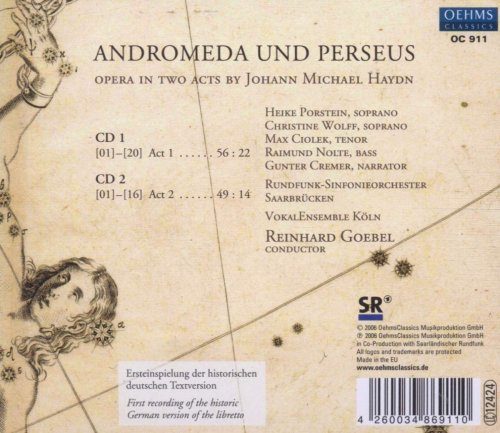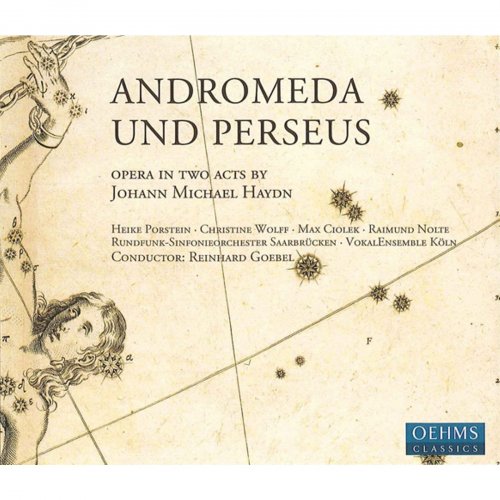
Heike Porstein, Christine Wolff, Max Ciolek, Saarbruken Radio Symphony Orchestra, Vokalensemble Koln, Reinhard Goebel - Haydn, M: Andromeda and Perseus (2010)
BAND/ARTIST: Heike Porstein, Christine Wolff, Max Ciolek, Saarbruken Radio Symphony Orchestra, Vokalensemble Koln, Reinhard Goebel
- Title: Haydn, M: Andromeda and Perseus
- Year Of Release: 2010
- Label: Oehms Classics
- Genre: Classical
- Quality: flac lossless
- Total Time: 01:45:32
- Total Size: 516 mb
- WebSite: Album Preview
Tracklist
01. Sinfonia
02. Accompanied Recitative. Sind die, o Amor, Deine (Andromeda)
03. Aria. Liebe, sind das die Freuden (Andromeda)
04. Die Kuste Athiopiens in Gegwitter und
05. Recitative. Aber welch ein Schwarm klagender (Phineus)
06. Chorus. Gut'ge Gotter, schont die Arme
07. Da kommt Perseus
08. Cefeo, ich gehe hin, um sie zu retten! (Perseus)
09. Perseus ist der einzige
10. Chorus. Lebe, Konigstochter
11. Tod, ja, war deine Losung (Perseus)
12. Perseus und Andromeda haben sich
13. Recitative. Was soll ich beginnen, Gotter (Phineus)
14. Aria. Gotter ach Erbarmen (Phineus)
15. Andromeda wunscht nur eines
16. Cavatina. Ach, erhore der Liebe Flehn (Andromeda)
17. Ihr Vater Kepheus kocht vor Wut angesichts
18. Aria. Soll mein Bruder stolzen Mutes (Kepheus)
19. Wahrend Andromeda und Perseus
20. Trio. Ja, bei Dir meines Lebens Sonne (Perseus, Andromeda, Phineus)
21. Aria. Du hast mir, o Konig (Perseus)
22. Perseus ist am Ziel seiner Wunsche
23. Aria. Geh Tyrann, du wirst nicht siegen (Phineus)
24. Phineus will sich nict kampflos in sein
25. Aria. Treuer Liebe susse Schmerzen (Andromeda)
26. Andromeda himmelt ihren heldenhaften
27. Chorus. Seht Perseus den Grossen
28. Aria. Es nahen die Augenblicke (Kepheus)
29. In das allgemeine Gluck
30. Welch ein Larmen hore ich! (Kepheus, Perseus, Phineus)
31. Nach Phineus Attentat auf Perseus ist Konig
32. Aria. Beglucken die Menschen (Perseus)
33. Perseus und Andromeda gelingt es endlich
34. Recitative. Perseus hor auf! (Phineus, Kepheus, Perseus, Andromeda)
35. Quartet Nun ist der Tag erschienen (Perseus, Andromeda, Phineus, Kepheus)
36. Chorus. Freude schenket uns hienieden (All)

Johann Michael Haydn never achieved the fame of his older brother, Franz Josef, but he had a respectable career as a church and court musician, particularly in the service of Cardinal Colloredo of Salzburg, who will go down in history for the lapse in judgment in which his stinginess caused Mozart to slip from his employ. Michael Haydn was Mozart's successor and suffered the same financial indignities that had driven the younger composer away. The Cardinal wanted a grand opera seria to celebrate his 15th anniversary as the head of the Archdiocese of Salzburg, but didn't want to lay out the expenses associated with such an ambitious venture, so he engaged Haydn, who had little experience in opera, and provincial singers rather than internationally recognized stars. The vocal limitations that Haydn had to accommodate led Leopold Mozart to dismiss the arias as being so simplistic "as to have been written for a choir boy." The elder Mozart's critique seems unfair in light of the music itself, which makes considerable, if not excessive demands on the singers. The soloists on this recording, sopranos Heike Porstein and Christine Wolff, tenor Max Ciolek, and bass Raimund Nolte, sound young, as if their voices aren't entirely quite settled yet, but they sing with purity, and often with lovely tone. The chorus, VokalEnsemble Köln, sings with freshness and ardor, and Rundfunk-Sinfonieorchester Saarbrücken, conducted by Reinhard Goebel, offers crisp and spirited accompaniment. The opera is sung in German translation, which is something of a novelty for an opera seria, and with some of the recitatives omitted and replaced by a speaker filling in the narrative gaps. Haydn's music is delightfully inventive, with a number of engaging solos and ensembles. Andromeda und Perseus is an attractive example of a late eighteenth century opera that deserves a wider audience.
01. Sinfonia
02. Accompanied Recitative. Sind die, o Amor, Deine (Andromeda)
03. Aria. Liebe, sind das die Freuden (Andromeda)
04. Die Kuste Athiopiens in Gegwitter und
05. Recitative. Aber welch ein Schwarm klagender (Phineus)
06. Chorus. Gut'ge Gotter, schont die Arme
07. Da kommt Perseus
08. Cefeo, ich gehe hin, um sie zu retten! (Perseus)
09. Perseus ist der einzige
10. Chorus. Lebe, Konigstochter
11. Tod, ja, war deine Losung (Perseus)
12. Perseus und Andromeda haben sich
13. Recitative. Was soll ich beginnen, Gotter (Phineus)
14. Aria. Gotter ach Erbarmen (Phineus)
15. Andromeda wunscht nur eines
16. Cavatina. Ach, erhore der Liebe Flehn (Andromeda)
17. Ihr Vater Kepheus kocht vor Wut angesichts
18. Aria. Soll mein Bruder stolzen Mutes (Kepheus)
19. Wahrend Andromeda und Perseus
20. Trio. Ja, bei Dir meines Lebens Sonne (Perseus, Andromeda, Phineus)
21. Aria. Du hast mir, o Konig (Perseus)
22. Perseus ist am Ziel seiner Wunsche
23. Aria. Geh Tyrann, du wirst nicht siegen (Phineus)
24. Phineus will sich nict kampflos in sein
25. Aria. Treuer Liebe susse Schmerzen (Andromeda)
26. Andromeda himmelt ihren heldenhaften
27. Chorus. Seht Perseus den Grossen
28. Aria. Es nahen die Augenblicke (Kepheus)
29. In das allgemeine Gluck
30. Welch ein Larmen hore ich! (Kepheus, Perseus, Phineus)
31. Nach Phineus Attentat auf Perseus ist Konig
32. Aria. Beglucken die Menschen (Perseus)
33. Perseus und Andromeda gelingt es endlich
34. Recitative. Perseus hor auf! (Phineus, Kepheus, Perseus, Andromeda)
35. Quartet Nun ist der Tag erschienen (Perseus, Andromeda, Phineus, Kepheus)
36. Chorus. Freude schenket uns hienieden (All)

Johann Michael Haydn never achieved the fame of his older brother, Franz Josef, but he had a respectable career as a church and court musician, particularly in the service of Cardinal Colloredo of Salzburg, who will go down in history for the lapse in judgment in which his stinginess caused Mozart to slip from his employ. Michael Haydn was Mozart's successor and suffered the same financial indignities that had driven the younger composer away. The Cardinal wanted a grand opera seria to celebrate his 15th anniversary as the head of the Archdiocese of Salzburg, but didn't want to lay out the expenses associated with such an ambitious venture, so he engaged Haydn, who had little experience in opera, and provincial singers rather than internationally recognized stars. The vocal limitations that Haydn had to accommodate led Leopold Mozart to dismiss the arias as being so simplistic "as to have been written for a choir boy." The elder Mozart's critique seems unfair in light of the music itself, which makes considerable, if not excessive demands on the singers. The soloists on this recording, sopranos Heike Porstein and Christine Wolff, tenor Max Ciolek, and bass Raimund Nolte, sound young, as if their voices aren't entirely quite settled yet, but they sing with purity, and often with lovely tone. The chorus, VokalEnsemble Köln, sings with freshness and ardor, and Rundfunk-Sinfonieorchester Saarbrücken, conducted by Reinhard Goebel, offers crisp and spirited accompaniment. The opera is sung in German translation, which is something of a novelty for an opera seria, and with some of the recitatives omitted and replaced by a speaker filling in the narrative gaps. Haydn's music is delightfully inventive, with a number of engaging solos and ensembles. Andromeda und Perseus is an attractive example of a late eighteenth century opera that deserves a wider audience.
As a ISRA.CLOUD's PREMIUM member you will have the following benefits:
- Unlimited high speed downloads
- Download directly without waiting time
- Unlimited parallel downloads
- Support for download accelerators
- No advertising
- Resume broken downloads


